#capital punishment abolition
Text
(U.S.) two people are being put to death this month
thomas creech in idaho and ivan cantu in taxes are both scheduled to be executed by the state on february 28, 2024. if you are so inclined, please sign these petitions asking for clemency for them.
#death penalty#death penalty action#petitions#capital punishment#prison abolition#if you signed all of the petitions in my previous post these were included in that but i think people get#overwhelmed by so many at once so i tried to break it up in hopes that's easier for people.
241 notes
·
View notes
Text

The person who posted this tiktok had this in their bio "safe space for all" bold claims for someone advocating for human experimentation

I hate it when people (especially young queer people) so boldly say stuff like this as if the US doesn't have a long history of doing unethical tests on non consenting (black and latino) prisoners
As always, if the state can violate one person's human rights, then they can violate yours too.
Incarcerated people are not always guilty, and in a world where state governments want to start prosecuting drag performers as sex offenders, I think we should be more leery of language and behavior that thoughtlessly dehumanizes people
And also
Someone can be a violent sex offenders who you hate, and they will still be a human being with inalienable rights. The two are not mutually exclusive.
#human rights#prisoners rights#acab#anti incarceration#incarceration#lgbt+#lgbt politics#politics#anti capital punishment#prison abolition#original#i contributed
9 notes
·
View notes
Text
Do you yall want to hear my favorite (/neg) fact? 27 states in the USA currently have the death penalty legalized. 10 have assisted suicide legal in medical situations. Can yall guess how many of those states overlap?
Maybe we should examine why it's legal for our government to enact death upon citizens as it sees fit. But our own people cannot have someone help ease their suffering.
#discourse#social discourse#anti capital punishment#anti death penalty#death penalty#capital punishment#abolish prisons#prison abolition#anti prison#prison industrial complex
33 notes
·
View notes
Text

#philosophy tube#source: Capital Punishment (& Prison Abolition) | Philosophy Tube#out of context youtube
4 notes
·
View notes
Text
Consequently, one must use a temporal modulation. The penalty transforms, modifies, establishes signs, arranges obstacles. What use would it be if it had to be permanent? A penalty that had no end would be contradictory: all the constraints that it imposes on the convict and of which, having become virtuous once more, he would never be able to take advantage, would be little better than torture; and the effort made to reform him would be so much trouble and expense lost by society. If incorrigible there be, one must be determined to eliminate them. But, for all the others, punishment can function only if it comes to an end.
Michel Foucault, Discipline and Punish
#sex offender registry#prison abolition#capital punishment#prison#michel foucault#discipline and punish#foucault#the birth of the prison#discipline and punish the birth of the prison#1977#foucault 1977
0 notes
Text
youtube
#death penalty#execution#prison#prison abolition#capital punishment#death penalty abolition#anti death penalty#police brutality#police violence#us politics#politics#systemic racism#racism in the criminal justice system#criminal justice system#Youtube
1 note
·
View note
Text
"One University of Minnesota study found that just 2.5% of co-victims reported achieving closure as a result of capital punishment, while 20.1% said the execution did not help them heal."
1 note
·
View note
Text
Here’s something to be proud of.
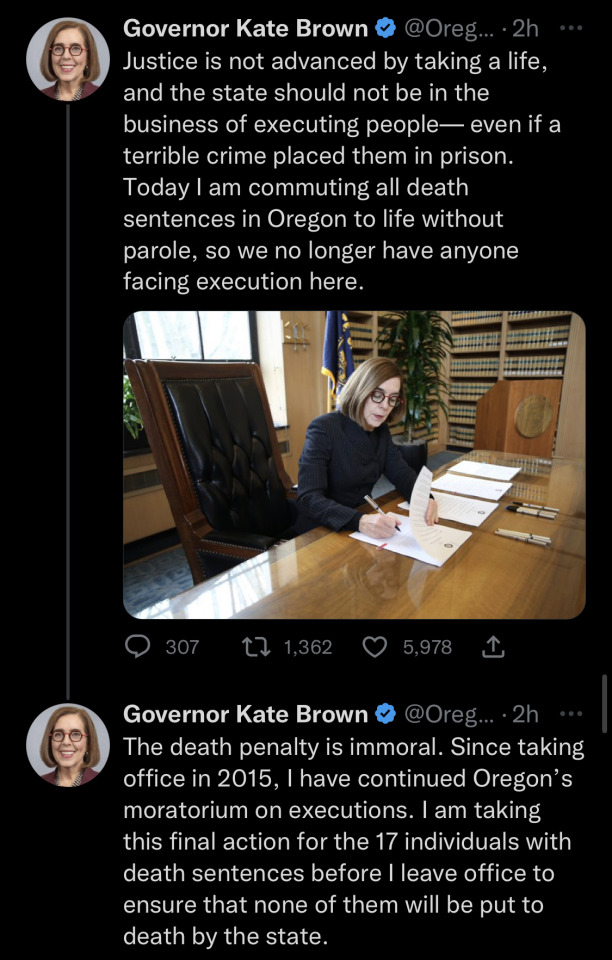
Governor Kate Brown, 12-13-22
Justice is not advanced by taking a life, and the state should not be in the business of executing people— even if a terrible crime placed them in prison. Today I am commuting all death sentences in Oregon to life without parole, so we no longer have anyone facing execution here.
The death penalty is immoral. Since taking office in 2015, I have continued Oregon’s moratorium on executions. I am taking this final action for the 17 individuals with death sentences before I leave office to ensure that none of them will be put to death by the state.
1 note
·
View note
Photo

“LA PEINE DEMORT ABOLIE EN ESPAGNE,” La Patrie. November 7, 1932. Page 1.
---
La prison demandée pour 26 anciens membres du gouvernment Rivera.
----
MADRID, 7 novembre. — Le Journal Officiel à publié un décret abolissant la peine de mort et réduisant les autres peines infamantes.
La commission des responsabiltés parlementaires demande la condamnadion à 20 ans ds prison de 26 prisonniers qui firent partie de l'administration militaire de Primo de Rivera ou en furent solidaires.
Les classes moyennes et supérieures abandonneat le présent régime et le gouvernement doit maintenant compter sur les classes ouvrières et une partie de l'armée,
#death penalty#capital punishment#abolition#spanish republic#república española#spanish revolution#judicial reform#criminal justice reform#interwar period#madrid
0 notes
Text
maybe it's just the Radical Rediker talking, but there's something pointed in the way that, say, popular pirate media like Pirates of the Caribbean dilutes the pirate's freedom to "bring me that horizon" as opposed to, say, "plenty and satiety, pleasure and ease, liberty and power" (Bartholomew Roberts).
broadly speaking, most pirates chose the life in order to escape and revenge the hard labour, corporal punishment, overworking, and unequal pay of merchant/navy/privateer ships; or the privations of their sudden unemployment once a war was over, ignored as soon as their ability to die for the state was unneeded. yes, many were thugs, but, consciously political or not, they were responding to a particular, material reality.
the pirate's desired freedom was from the effects of exploitative modes of statehood and capital production. but popular media usually shifts this into a general desire for freedom: freedom to roam, freedom to love (usually merely a cross-class white, heterosexual union), or freedom from the personal pressures of social norms. it's a vague, ahistorical, post-Enlightenment, libertarian ideal rather than a response to a real social and economic situation.
to be clear, this only really applies to specifically the late golden age of piracy, in the first quarter of the 18th century. earlier generations of pirates/buccaneers often displayed nationalist/religious motives, and were lauded, tolerated, or even encouraged by the French and English states for aiding their fights against the Spanish and Portuguese. only the last gasp of age of sail pirates had a truly anti-national energy, and both figured themselves, and were figured by the imperial powers, as the enemies of all nations.
but if we are to valourise the late golden age pirate, at his best, his ideals were for true democracy, and the abolition of nation, hierarchy, and labour exploitation; not "the horizon". he was striking out in response to specific political, social, and economic oppressions, rather than a general individual restlessness, and that reality - and its similarities to our own - are important.
I dunno, I just... have a lot of thoughts about the defanging of piracy in modern media. obviously there were a lot of things bad about them, too, and the level of egalitarianism varied between individual people and ships. but again, if we're going to be valourising them anyway... there were idealists. and they weren't subtle about they wanted.
"I shan't own myself guilty of any murder", said William Fly in 1726. "Our captain and his mate used us barbarously. We poor men can't have justice done us. There is nothing said to our commanders, let them never so much abuse us, and use us like dogs. But the poor sailors --"
#pirates#history#pirate history#Togas does meta#Rediker is Marcus Rediker and I've only just started finally reading some of his work properly but god it's good#also if you've watched Black Sails I'd love to know how much of this energy is in there#it's a bit too ~gritty for my tastes but I get the impression it's also a bit vague about freedom over material historical politics#but i could be wrong!#obviously PotC has an ingrained anti-EIC vibe but even then it's more about ''they're enclosing the sea against us wild rovers'' than#''company captains beat us half to death just for the wealth we facilitate to be funnelled to the top while us sailors are left to rot''#and christ knows it's not interested in historical realities XD
112 notes
·
View notes
Text
Loving the people in your family, mind you, is not at odds with a commitment to family abolition. Quite the reverse. I will hazard a definition of love: to love a person is to struggle for their autonomy as well as for their immersion in care, insofar such abundance is possible in a world choked by capital. If this is true, then restricting the number of mothers (of whatever gender) to whom a child has access, on the basis that I am the “real” mother, is not necessarily a form of love worthy of the name. Perchance, when you were very young (assuming you grew up in a nuclear household), you quietly noticed the oppressiveness of the function assigned to whoever was the mother in your home. You sensed her loneliness. You felt a twinge of solidarity. In my experience, children often “get” this better than most: when you love someone, it simply makes no sense to endorse a social technology that isolates them, privatizes their lifeworld, arbitrarily assigns their dwelling-place, class, and very identity in law, and drastically circumscribes their sphere of intimate, interdependent ties. But I am getting ahead of myself.
Most family abolitionists love their families. It is true of course that it is usually the people who have had bad experiences within a social system, and who feel things besides love for that system, who initiate movements to overthrow it. But loving one’s family in spite of a “hard childhood” is pretty typical of the would-be family abolitionist. She may, for instance, sense in her gut that she and the members of her family simply aren’t good for each other, while also loving them, wishing them joy, and knowing full well that there are few or no available alternatives in this world when it comes to providing much-needed care for everybody in question. Frankly, loving one’s family can be a problem for anyone. It might put extra weights around the ankles of a domestic battery survivor seeking to escape (especially given the economic punishments imposed by capitalism on those who flee commodified housing). It might hinder a trans or disabled child from claiming medical care. It might dissuade someone from getting an abortion. Right now, few would deny that reproductive rights—let alone justice—are everywhere systematically denied to populations. Austerity policies purposively render proletarian baby-making crushingly unaffordable, even for two or three or four adults working together, let alone one. Housework is sexed, racialized, and (except in the houses of the rich) unwaged. It is unsurprising, in these global conditions, that large numbers of humans do not or cannot love their families. Reasons range from simple incompatibility to various phobias, ableism, sexual violence, and neglect.
— Sophie Lewis, Abolish the Family. Verso, 2022.
#I wish I had a page number to cite! I don't because my copy of this book is a lousy epub#lol#Sophie Lewis#family abolition
314 notes
·
View notes
Note
hi!! over the past year or so, i’ve been radicalizing leftwards (does that make sense?), and while i do like to say that i have a pretty good understanding of things like socialism and communism and such, one thing i haven’t really been able to figure out is what anarchism is and how it works. like, i get the basic idea, but what with google being google and most people on breadtube not being anarchist, it’s definitely not as easy to research as socialism.
anyways, tl;dr: what defines anarchism and how does it work?
thanks in advance! have a cookie 🍪
"Anarchism asserts the possibility of an organization without discipline, fear, or punishment, and without the pressure of poverty: a new social organism which will make an end to the terrible struggle for the means of existence,—the savage struggle which undermines the finest qualities in man, and ever widens the social abyss. In short, Anarchism strives towards a social organization which will establish well-being for all."
leftward ho! thanks for writing. these questions are always difficult to answer because i don’t know where you’re coming from on your personal journey. but i’ll try to answer some of the basics and recommend some good resources to start with.
first of all, there are many anarchisms and if you ask three anarchists you’ll get five opinions. but probably the most prevalent form of anarchism is anarcho-communism, so while i’ll try to talk broadly from a general anarchist position, much of it be from an anarchocommunist perspective for simplicity’s sake.

at it’s most basic, anarchism is an opposition to hierarchy, to one person having control over another. it is a radical commitment to compassion and absolute freedom. like communists, anarchists want a moneyless, stateless, and classless society. unlike leninists, who falsely claim to be communists, we know that there has never been a good state, and never can be. they are by their very nature oppressive, and cannot be used as a means to an end to achieve communism. no group or individual can wield that much power over others and not become corrupted by it. absolute power corrupts absolutely, etc. so while we are committed to the fight against capitalism, we are also committed to the fight against the state. they are intertwined and must be defeated simultaneously. so we believe in the abolition of all government and the organization of society on a voluntary, cooperative basis without recourse to force or compulsion, and the abolition of money and private property, as the best way to ensure the basic and higher needs of everyone are met.
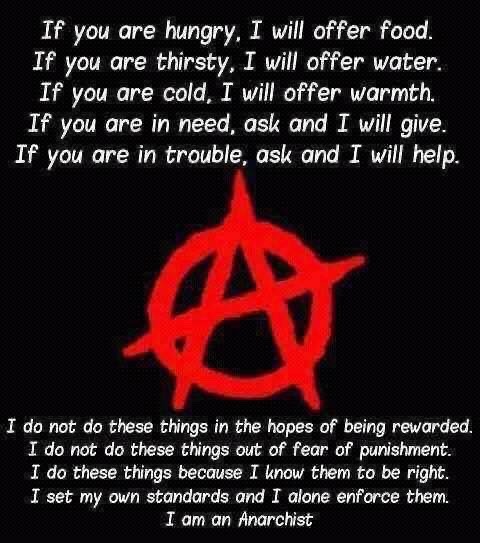
if you haven’t read it yet, the wikipedia article for anarchism is actually a pretty good place to start:
Anarchism is a political philosophy and movement that is skeptical of all justifications for authority and seeks to abolish the institutions they claim maintain unnecessary coercion and hierarchy, typically including, though not necessarily limited to, the state[1] and capitalism. Anarchism advocates for the replacement of the state with stateless societies or other forms of free associations. As a historically left-wing movement, usually placed on the farthest left of the political spectrum, it is usually described alongside communalism and libertarian Marxism as the libertarian wing (libertarian socialism) of the socialist movement.
Humans lived in societies without formal hierarchies long before the establishment of formal states, realms, or empires. With the rise of organised hierarchical bodies, scepticism toward authority also rose. Although traces of anarchist thought are found throughout history, modern anarchism emerged from the Enlightenment. During the latter half of the 19th and the first decades of the 20th century, the anarchist movement flourished in most parts of the world and had a significant role in workers' struggles for emancipation. Various anarchist schools of thought formed during this period. Anarchists have taken part in several revolutions, most notably in the Paris Commune, the Russian Civil War and the Spanish Civil War, whose end marked the end of the classical era of anarchism. In the last decades of the 20th and into the 21st century, the anarchist movement has been resurgent once more.
Anarchism employs a diversity of tactics in order to meet its ideal ends which can be broadly separated into revolutionary and evolutionary tactics; there is significant overlap between the two, which are merely descriptive. Revolutionary tactics aim to bring down authority and state, having taken a violent turn in the past, while evolutionary tactics aim to prefigure what an anarchist society would be like. Anarchist thought, criticism, and praxis have played a part in diverse areas of human society.
https://en.wikipedia.org/wiki/Anarchism
i don’t know how much original theory you’ve read before, but i’ll give some reading recs. personally i’m a big fan of peter kropotkin, and found the conquest of bread to be a breath of fresh air after studying marx for years. others have recommended starting with errico malatesta’s anarchy or peter gelderloos’ anarchy works. and zoe baker (anarchopac) is excellent if videos or tweets are more your speed.
https://enoughisenough14.org/2019/06/10/anarchism-a-very-short-introduction-by-colin-ward/
getting involved masterpost
hopefully that’s enough to get you started but please feel free to ask questions, and there are many more knowledgable people here who can help as well.
2K notes
·
View notes
Text
[“Before many cases involving sexual violence go to trial, they’re handled by police departments. This—cops handling rape cases—is supposed to make us feel safe; copaganda quite literally relies on rape victims as a narrative device, teaching us to understand white-washed notions of safety and justice from a lens of punishment and policing, of abusers and law enforcement as at odds rather than one and the same.
We’ve been taught to understand violence from a uniform, racist, and classist lens, while ignoring institutionalized, white-supremacist state violence that unfolds all around us. We’ve been taught to understand the criminal legal system as cops keeping rapists and killers off the streets, instead of questioning the vast, overarching intersections between these two supposedly oppositional groups, or why some acts but not others are seen as violent, pending who performs them.
The inherent fragility, even coercive transactionality, of the relationship between the police state and those subjected to gendered violence has been laid bare by police departments’ responses to a 2020 letter of support for racial justice and abolition called “The Moment of Truth,” written and cosigned by domestic violence advocacy groups and direct services organizations across the country. Some of these organizations had previously received public funding from local governments and had referral partnerships with police departments. After they signed onto the letter, some lost funding, and others said police stopped referring victims to their services. Police and other state actors have long capitalized on the vulnerability of groups like domestic violence victims for power, funding, and even legitimacy. When survivors identified this exploitative dynamic for what it is in their letter and questioned what abuse victims have ever gained from more funding for policing, law enforcement institutions openly, unabashedly retaliated against them.”]
kylie cheung, from survivor injustice: state-sanctioned abuse, domestic violence, and the fight for bodily autonomy, 2023
58 notes
·
View notes
Text
The Quartering of Ravaillac
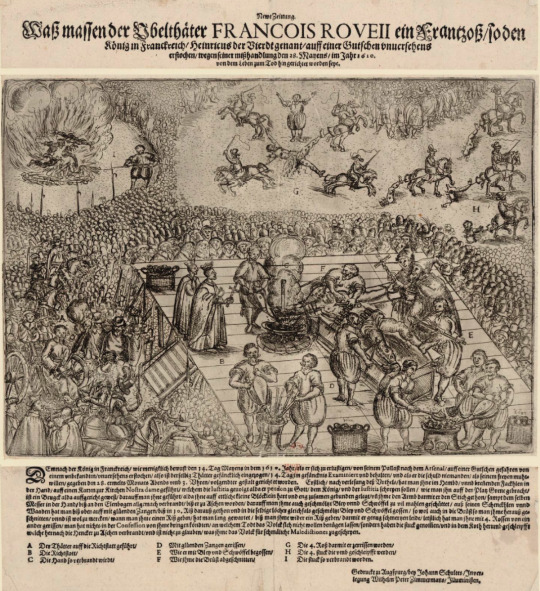
Before the guillotine made French people equal, and before the abolition of capital punishment altogether made them equal and also not dead, tradition dictated that commoners be hanged and nobles beheaded. Two crimes however warranted a special kind of execution, being heresy with the condemned burnt at the stake and in this case regicide, which specifically demanded quartering for some reason. François Ravaillac was the product of the French Wars of Religion, a series of conflicts during the Protestant Reformation that tore France appart, only ending when the leader of the Calvinist Huguenots Henri III de Bourbon, king of Navarre and issued from a cadet branch of the royal dynasty of France, succeeded to Henri III de Valois, king of France. The condition to his coronation was for him to convert to Catholicism, which he did, being quoted as saying “Paris is well worth a mass”. Ravaillac was born in a staunchly catholic family, being raised by his two uncles, both canons in the local cathedral, to bear a fervent hatred of Huguenots. His instable mind led him to quit a well-off situation working as a clerk to try and join a monastic order, of which he was kicked out after only a few weeks. Now penniless and aimless, he started experiencing visions and confessed multiple times over the years of having committed “homicide through intent”, growing more and more resentful of the king whom he saw as the Antichrist ready to wage war on his people and move the Holy See from Rome to Paris. After stealing a knife from an inn, he eventually graduated to “homicide through actual homicide” after stalking the royal carriage all the way to one of the traffic jams Paris is famous for, giving him the opportunity to stab the king twice in the chest when it stopped.
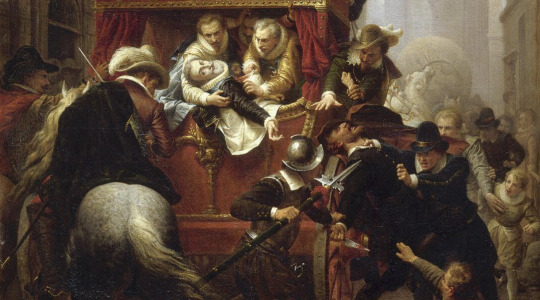
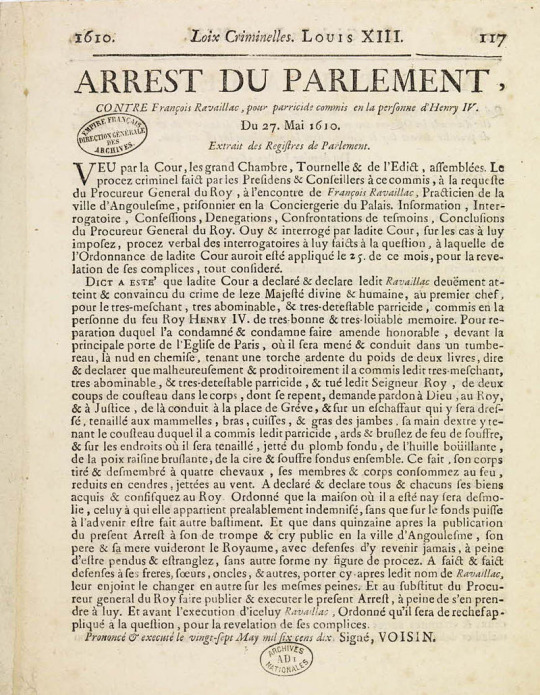
Execution warrant for François Ravaillac from the Parisian parliament, headed with the name of king Louis XIII and bearing the later archival stamps of both the French Empire and French Republic. It describes the murder as a parricide, the murder of a relative, as the king was seen as a literal father figure to all his subjects.
After being held in protective custody in a private hotel, then transferred to the Conciergerie prison and tortured/tried for ten days, Ravaillac was sentenced to death on the 27th of May 1610. His regicide was ruled to be the act of a lone religious fanatic without any accomplice.
The same day, he was taken to the place de Grêve in front of Paris’ town hall, where public executions had traditionally been held for at least 300 years. All according to his execution warrant, Ravaillac’s chest, arms, thighs and calves were pulled apart with tongs; his right hand which had held the knife was cut off and thrown onto burning sulfur; his wounds were covered in molten lead, boiling oil, pitch, wax and sulfur; finally his limbs were attached to four horses, pulling them from their sockets - allegedly with some help from an axe - completing the quartering proper.
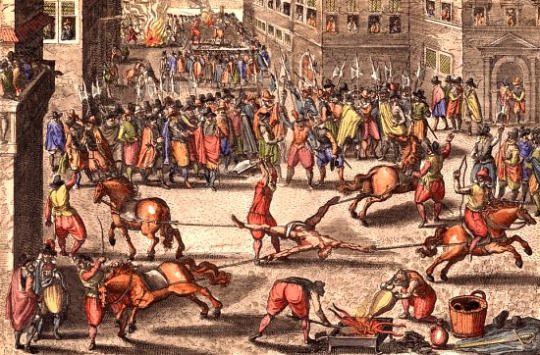
Unfortunately for him and in a quite striking karmic twist, some insult was added to Ravaillac’s supplice, as his legacy was to cement Henri IV’s own as the Good King Henry. The king’s martyr at the hand of a madman garnered sympathy and dispelled his previous image of a Bourbon usurper with Catholics and of a relapse with Protestants, working wonders to unify the two under the new monarchy. Henri’s progeny would not only rule France for another 182 years without interruption, but Spain, Luxembourg and other holdings in Italy.
138 notes
·
View notes
Text
In “Essay on the Awkward / Black / Object,” which appears in Sympathetic Little Monster (2018), Awkward-Rich meditates on the racialization of “awkward,” which is both the speaker’s father’s last name and, for the speaker, a mode of Black being. While awkwardness is not a diagnostic category, its adjectival form allegorizes disability, in much the same way that my peers heralded my neurodivergence by calling me Awkward John. As a racialized term, “awkward” reveals the contingence and tension between race and disability: at once overlapping and yet cleaved apart. Reflecting on the history of slavery through which many African Americans received their last names, Awkward-Rich writes, “You already know the story. A man is made into a thing & sutured to it. The name” (18). The name “Awkward” recalls a violent, familial history but also gestures toward an escape from it, a flight from its inheritance: “Awkward as both punishment & method” (23). As method, awkwardness is a form of negativity and refusal. It is, at once, a recognition of the status of Blackness in an antiblack world—“As long as the object works it is bound to its own annihilation” (21)—and a resignification of that status. “The solution?” the poem’s speaker tells us plainly, “Fall. Fall apart. Decay” (21). To fall apart and decay is to allow the wash of negativity to soak you through. It’s to breathe with the chill of your skin as the negativity dries. To adopt such affective stillness, to be held fast in the iciness of bad crip feelings, is to embrace the power of refusal.
This isn’t the reclaimed power of the category of disability, a power bestowed by legibility. This isn’t really empowerment at all. This power is sourced internally by refusing Reason. It’s to refuse the expectation of endurance. It’s to refuse your own instrumentalization—as disabled, as racialized, as queer. Not because you aren’t those things but because you aren’t those things in the way they want you to be. They as family, as employer, as school, as government, as society, as capitalism, as ableism, as white supremacy, as cisheterosexism. To fall. Fall apart. Decay. These things we can do. We do them so very well. So well, in fact, we might call them symptomatic of a debility drive: not ushered into death or disability—contra Edelman and Mollow—but receding back into debility, into fungibility, into the obscurity of invisibility that comes with refusing categorical adherence. This is not a romanticization of abjection nor a negligent omission of people who never had access to the category of disability to begin with; rather, it is a condition of abolition for us all.
J. Logan Smilges, Crip Negativity.
[emphasis added]
41 notes
·
View notes
Text
i just finished rewatching the film copycat, a film i used to adore and rewatch a lot in my early to mid teens, but irks me as an adult now that i finally have the ability to spot concealed allegory.

on its surface it’s a decent, well-made thriller, but beneath that surface its message is an insidious indictment of those supporting, and that supports consequences, of eschewing capital punishment.
helen, our ‘misguided’ would-be victim and longtime sufferer of paranoia, is the consequence of supporting the abolition of capital punishment. her agoraphobia is a direct result of her fear of a repeat attack, a fear reinforced by the ineffectual imprisonment of her would-be murderer, who has escaped confinement once before. helen is first introduced advocating the use of studying serial killers to prevent the fostering of others in their wake, but will all too soon be victim of that same belief. she survives the first attempt at her life, but instead of daryll’s imprisonment bringing the foresight and wherewithal to prevent future serial killers, and that safety promised with it, he becomes a leader/teacher for his disciples, one of whom is our copycat killer.
we then have monahan and goetz, monahan represents helen’s point of view, as demonstrated by her belief in incapacitating criminals rather than goetz’ strategy, which is barraging a criminal with bullets until they’re no longer a threat. we’re offered a counterpoint to the effectiveness of goetz’ strategy by monahan, who warns him against the dangers of accidentally murdering an innocent, but the film never challenges this potential. the only deaths caused by cops are those that are indisputably guilty.
these opposing points of view first come to the test in the form of goetz’ murder, where monahan’s technique of incapacitating criminals instead of killing them directly leads to goetz’ preventable death. it acts as an event to shake her belief, which will be tested again when she comes head to head with the copycat killer. this time, she uses the lesson learned from the death of her partner to ensure the death of the copycat, lest helen be killed like monahan’s partner before her.
the repetition of events serving as a correction to misguided beliefs isn't only portrayed through monahan's 'heroic journey', but through the films climax, and the cyclical nature of it. the copycat's death itself is the correction of the prior mistake made from sparing daryll of capital punishment. if the copycat represents all serial killers and their propensity of learning from those before them, then his belief that he is serving as a revision of where daryll failed, is the inverse of the film's message. which is that the copycat's death is the rectification of where the law had failed daryll.
this message is demonstrated most clearly by the open ending, where daryll continues leading more disciples down the same path that the copycat had taken, and failed, before them. if daryll had received the capital punishment that the copycat had ‘rightfully deserved’, then the law would have prevented his further nurturing of aspiring serial killers.
copycat never openly rebukes the abolition of capital punishment, it only ever disguises its beliefs in the consequences of abolishing it through choices made facing immediate threats. but it’s hard to ignore the parallels drawn between the two, and the implications it has on cops as infallible moral enforcers of the law.
#copycat 1995#i never post reviews but i thought this movie needed some criticism bc i think its copaganda is often ignored in service for another readin#a reading i'm all for but there are pitfalls to be wary of before baselessly praising media
32 notes
·
View notes